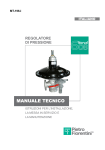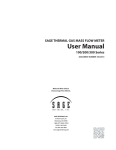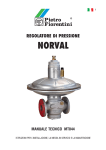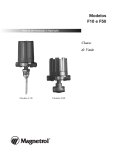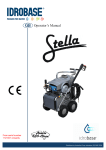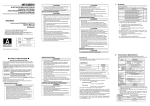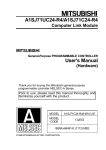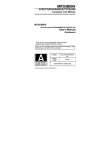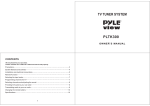Download USER MANUAL FOR FIO2 INSTALLATION IN
Transcript
F.I.O. ENGLISH User’s Manual NORVAL FIO USER MANUAL FOR FIO2 INSTALLATION IN NORVAL REGULATOR F.I.O. User Manual – Ed.2. Rev.5 The information contained in this document is confidential and the property of Pietro Fiorentini S.p.A. Technical data may undergo changes without notice Page 1/ 19 F.I.O. ENGLISH User’s Manual Edition 1 Revision 0 Date 11/02/2015 Index 1. Introduction ..................................................................................................................................................... 3 2. Installation of Q-kit for indirect flow measurement (IFM)........................................................................... 4 3. 2.1 Q-kit 4 2.2 Internal and external parts replacement 4 Setting of stroke limits of regulator (0% and 100%) ................................................................................... 7 3.1 Preparation of FIO2 menu and password entering 7 3.2 Setting the full scale of the regulator (100%). 8 3.3 Setting the zero of the regulator (0%). 9 3.4 Save of the settings. 9 3.5 Setting the zero of the regulator with Low Trim Scale (<0%). 10 4. Setting of Cg curve on the FIO2 .................................................................................................................. 11 5. Installation of P-kit for Outlet Pressure Control (OPC) ............................................................................ 13 5.1 P-kit for Norval FIO 13 5.2 Internal and external parts replacement 13 5.3 Pilot system installation and tubing connections 15 5.4 Downstream connections 16 6. Startup of Norval FIO ................................................................................................................................... 17 7. Test of solenoid valves ................................................................................................................................ 18 F.I.O. User Manual – Ed.2. Rev.5 The information contained in this document is confidential and the property of Pietro Fiorentini S.p.A. Technical data may undergo changes without notice Page 2/ 19 F.I.O. ENGLISH User’s Manual 1. Introduction This document is a USER MANUAL FOR THE EXPLANATION OF THE OPERATIONS TO BE PERFORMED ON FIELD FOR THE INSTALLATION AND COMMISSIONING OF THE FIO2 APPLICATION ON NORVAL REGULATOR. It describes the phases of: -installation of Q-kit for indirect flow measurement (IFM) -setting of stroke limits of regulator (0% and 100%) on FIO2 -setting of regulator Cg curve on FIO2 -installation of pilot P-kit for Outlet pressure Control (OPC) -startup of Norval FIO -test of solenoid valves Note: the instructions for the installation of Q-kit and P-kit as been explained independently because, depending by needs, can be installed only one of the two applications. Obviously, in case of complete upgrade (Q-kit + P-kit), the new parts of both kit can be replaced at the same time. BEFORE STARTING THE OPERATIONS, CLOSE UPSTREAM AND DOWNSTREAM BALL OR BUTTERFLY VALVES AND DISCHARGE ALL THE PRESSURE IN THE LINE. F.I.O. User Manual – Ed.2. Rev.5 The information contained in this document is confidential and the property of Pietro Fiorentini S.p.A. Technical data may undergo changes without notice Page 3/ 19 F.I.O. ENGLISH User’s Manual 2. Installation of Q-kit for indirect flow measurement (IFM) 2.1 Q-kit The Q-kit consists of a transducer for the acquisition of the displacement % of the Norval regulator from the closing position. It is composed on a resistive transducer coupled to the main diaphragm of the Norval regulator for the reading of the position. The transducer is wrapped on an aluminum cover in order to ensure the protection against atmospheric events. The coupling with the diaphragm kit is guaranteed by the magnet located at the end of the rod. It is supplied preassembled (see picture on the right). For Norval application has been provided two models: shorter rod for head 375 and 375 TR; longer rod for head 495 and 630 . Head 375 Head 375/TR 2.2 Head 495 Head 630 Internal and external parts replacement Unscrew the setting screw; unscrew the cab; remove the spring with the spring guide; remove the top cover; remove the bottom flange of the body.. 1- Unscrew the screw that holds the stem on the diaphragm. With one hand pull out the stem from the bottom side of the regulator. 2- Put the diaphragm kit out of the regulator and unscrew the big screw 3- Remove the lower spring guide above the plate. F.I.O. User Manual – Ed.2. Rev.5 The information contained in this document is confidential and the property of Pietro Fiorentini S.p.A. Technical data may undergo changes without notice Page 4/ 19 F.I.O. ENGLISH User’s Manual Put on the plate the plastic spacer for the position feedback. 4- Insert the metallic plate for the alignment of the spacer. Take care for the right positioning. 5- Put the belleville washer if present. 6- Put the lower spring guide. 7- Screw the big screw, taking care that the spring guide has to remain free even if the screw is fixed. 8- Lock the big screw. 9- Insert from the bottom body the stem and join it on the diaphragm kit with the screw. 10- Before fixing the screw definitely, align all the holes of the lower cover with the holes of the diaphragm. 11- Lock the screw with three keys in order to avoid the rotation of the diaphragm . 12- Fix the screws to close the bottom flange of the regulator. 13- Assemble the top cover. 14- Insert the spring and the guide. F.I.O. User Manual – Ed.2. Rev.5 The information contained in this document is confidential and the property of Pietro Fiorentini S.p.A. Technical data may undergo changes without notice Page 5/ 19 F.I.O. ENGLISH User’s Manual 15- Screw the cap completely and screw the setting screw. 16- The setting screw has to push the spring guide below the ½” female thread. 17- The cap has two ½” female threads. Screw a ½” plug in the hole closer to the antipumping valve. 18- In the other hole in the opposite side of the cap screw the ½” elbow. 19- Unscrew the antipumping valve. 20- Screw the antipumping valve on the elbow 21- Screw the sleeve on the ½” female threadolet of the cover. 22- Screw the transducer, taking care to insert the rod inside the cover as much vertical as possible, in order to have the best measurement accuracy and prevent frictions. Note:This procedure is for the field upgrade. Vice versa, the Norval regulators assembled in factory ordered with Q-kit already built-in, will be provided with two ½” female threadolet directly on the top cover. In that case the antipumping valve position won’t be modified and the cap will be the standard one. The transducer will be assembled on the second threadolet. F.I.O. User Manual – Ed.2. Rev.5 The information contained in this document is confidential and the property of Pietro Fiorentini S.p.A. Technical data may undergo changes without notice Page 6/ 19 F.I.O. ENGLISH User’s Manual 3. Setting of stroke limits of regulator (0% and 100%) The indirect measurement of the flow rate is based on the correlation between the position % of a specific regulator and the inlet and outlet pressures. The position is measured through the displacement transducer. It has a measurement range greater than the stroke of the regulator. So it is necessary for the FIO2 to know exactly the position of complete opening and complete closing of the regulator (see example on the right) on order to calculate by interpolation the intermediate position % during the working operation. 3.1 Preparation of FIO2 menu and password entering Press two times the “ESC” button. FIO2 display switches on. Press “F3” to activate the back-light if necessary. 1 2 3 Press L1 for Line 1 setting Press L2 for Line 2 setting 4 Press F3 for Calibration menu 5 F.I.O. User Manual – Ed.2. Rev.5 The information contained in this document is confidential and the property of Pietro Fiorentini S.p.A. Technical data may undergo changes without notice Page 7/ 19 F.I.O. ENGLISH User’s Manual 6 Pressing the button “F1” or “F2”, considering that is the first modification that you are going to do, the FIO2 asks the introduction of the password (the default is “1”). 8 7 9 10 3.2 Setting the full scale of the regulator (100%). The regulator is a spring loaded type, so without pressure is normally open. For that reason is suggested to start from the setting of the full scale of the regulator. 2 Verify that the position value in count is stable, than press “F2” and, finally, Esc. 1 F.I.O. User Manual – Ed.2. Rev.5 The information contained in this document is confidential and the property of Pietro Fiorentini S.p.A. Technical data may undergo changes without notice Page 8/ 19 F.I.O. ENGLISH User’s Manual 3.3 Setting the zero of the regulator (0%). 1- Pressurize the regulator. 2- Perform all the required settings (Slam shut valve, monitor). 3- Adjust, with the setting spring, the required outlet pressure value, flowing with a ½” ball valve on downstream side open at 45° discharging in atmosphere 4- Set the Zero on FIO2 with the following procedure We suggest to perform the zero setting with this small flow rate in order to be sure that the regulator is not working under lock-up pressure. In fact, in lock-up pressure case, the zero would correspond to the position of the seat while it is penetrating in the rubber (see example on the right, case A). The error that could be made in the indirect flow measurement in case “A” would be with no doubt greater than the error generated when considering the zero in a condition of lamination very close to the rubber surface (see example on the right, case B). A B 2 Verify that the position value in count is stable, than press “F2” and, finally, Esc. 1 3.4 Save of the settings. The first opening calibration of FIO2 must been done for both limits (100% and 0%). In case of following adjustment, is possible to adjust only one of the limits. In any case, after the setting procedure, is necessary to save the new data pressing “F3”. In case of mistakes, press “F4” in order to esc from the calibration menu without saving. F.I.O. User Manual – Ed.2. Rev.5 The information contained in this document is confidential and the property of Pietro Fiorentini S.p.A. Technical data may undergo changes without notice Page 9/ 19 F.I.O. ENGLISH User’s Manual 3.5 Setting the zero of the regulator with Low Trim Scale (<0%). Sometime the flow rate passing through the regulator can be measured with an external device or there is a meter upstream or downstream. In this case is possible to enter this value on FIO2 as Low trim. FIO2 will calculate the corresponding opening value and redefined the Zero of the regulator. The flow rate that can be entered must be, in any case, very low and must be a corrected value in Smc/h. From the Calibration Menu, press Enter, type the measured flow rate in Smc/h (in this example 55), Enter again and Save. 1 23 4 5 F.I.O. User Manual – Ed.2. Rev.5 The information contained in this document is confidential and the property of Pietro Fiorentini S.p.A. Technical data may undergo changes without notice Page 10/ 19 F.I.O. ENGLISH User’s Manual 4. Setting of Cg curve on the FIO2 The formula for the calculation of flow rate with the indirect method needs, as input, the Cg value at that specific opening position. The Cg value can be determinate through the Cg curve (Cg vs opening) starting from the opening position. Every type and size of regulator has his specific Cg curve, also the accessories modifies it. In order to determine the correct Cg value correlated to the opening position, FIO2 needs to have stored the proper regulator Cg curve. The download on the FIO2 of the Cg curve is carried out with the software Fio2Modbus. Open Fio2Modbus and connect to FIO 2.0 1. Press basic setup 2. Press LOAD (Cg curve) 1 2 F.I.O. User Manual – Ed.2. Rev.5 The information contained in this document is confidential and the property of Pietro Fiorentini S.p.A. Technical data may undergo changes without notice Page 11/ 19 F.I.O. ENGLISH User’s Manual 3. Make the below choices: Norval X” - DN XX Silencer: NO Accessory: None / *IN (SN) Enable second line: YES / NO Press copy config. if second Line is identical to the first Line. Otherwise configure the different second Line as it is. 4. Press OK 3 4 F.I.O. User Manual – Ed.2. Rev.5 The information contained in this document is confidential and the property of Pietro Fiorentini S.p.A. Technical data may undergo changes without notice Page 12/ 19 F.I.O. ENGLISH User’s Manual 5. Installation of P-kit for Outlet Pressure Control (OPC) 5.1 P-kit for Norval FIO Norval regulator in the standard version is a pure spring loaded regulator. In order to be able to modulate the outlet pressure a 300 series pilot has been introduced. The pilot, opening, depressurize the balancing chamber, so the inlet pressure pushes on the gasket with an higher force compared to the force of the balancing diaphragm to the top. The result of ths unbalancing is that the gasket opens more, flow rate increases and the outlet pressure too. The pilot, managing this unbalance, can increase the setting of the regulator. 5.2 Internal and external parts replacement Diassemble all the regulator internal parts, except the parts related to the slam shut if present (unscrew the setting screw; unscrew the cab; remove the spring with the spring guide; remove the bottom flange; remove the top cover; unscrew the screw that holds the stem on the diaphragm kit; pull out the stem; put the diaphragm kit out of the regulator; remove the bottom cover). 1- Remove the old intermediate flange with the stem guide 2- 3 Assemble all the o-ring and I/DWR ring and screw the stem guide on the intermediate flange (add some locking glue on the thread) 3- F.I.O. User Manual – Ed.2. Rev.5 The information contained in this document is confidential and the property of Pietro Fiorentini S.p.A. Technical data may undergo changes without notice Page 13/ 19 F.I.O. ENGLISH User’s Manual 4- Screw all the extensions and the fittings provided in the kit. 5- Put on the lower side of the flange the two O-rings. Help them to remain in proper position spreading some grease 6- Insert the group on the body. 7- 8-9 Assemble the balancing diaphragm group. 89- 10- Put the balancing diaphragm group on the flange. Put also the external o-ring. Check the lower O-rings position. 11- Put the bottom cover on the flange. Screw the 4 screws. 12- Put on the bottom cover the diaphragm kit, insert from the bottom body the stem and join it on the diaphragm kit with the screw. 13- Before fixing the screw definitely, align all the holes of the lower cover with the holes of the diaphragm. 14- Lock the screw with three keys in order to avoid the rotation of the diaphragm. 15- Assemble the top cover. F.I.O. User Manual – Ed.2. Rev.5 The information contained in this document is confidential and the property of Pietro Fiorentini S.p.A. Technical data may undergo changes without notice Page 14/ 19 F.I.O. ENGLISH User’s Manual 16- Insert the spring and the guide. 17- Screw the cap completely and screw the setting screw. 18- Fix the screws to close the bottom flange of the regulator. In the rear side of the regulator (the opposite side of the slam shut valve) include the bracket for the tank. Use the longer screws. 5.3 Pilot system installation and tubing connections 19- Install the pilot in one hole of the covers (upstream side). 20- Install the remote control kit on the support fixing the two screws. 21- Make all the tubing connections between regulator and pilot, pilot and remote control kit and remote control kit and regulator. F.I.O. User Manual – Ed.2. Rev.5 The information contained in this document is confidential and the property of Pietro Fiorentini S.p.A. Technical data may undergo changes without notice Page 15/ 19 F.I.O. ENGLISH User’s Manual 5.4 Downstream connections A B A: Pilot discharge. Flow rate. B: Sensing line connection. No flow rate. IMPORTANT: Keep the connections “A” and “B” to the line separate in order to avoid that the flow rate passing in “A” influence the measurement of sensing line “B”. Install a ball valve in “A” connection in order to exclude easily the pilot system and restore the Norval FIO as a standard Norval regulator. F.I.O. User Manual – Ed.2. Rev.5 The information contained in this document is confidential and the property of Pietro Fiorentini S.p.A. Technical data may undergo changes without notice Page 16/ 19 F.I.O. ENGLISH User’s Manual 6. Startup of Norval FIO 1- Close the pilot discharge valve in order to exclude the pilot from the system. 2- Pressurize the regulator. 3- Perform all the required settings (Slam shut valve, monitor). Leave the slam shut open. 4- Open a valve on downstream side discharging in atmosphere. 5- Adjust, with the main spring, the setting of Norval regulator to the minimum required outlet pressure value. 6- If possible, open the downstream main valve and adjust the setting in real working condition. 7- Unscrew completely the setting screw of the pilot. 8- Set the AR100 restrictor to position 1. 9- Open slowly the pilot discharge valve. 10- With the same flow rate applied in during the setting of main spring, increase slowly the setting of the pilot, and stop increasing as soon as the outlet pressure start to increase too. 11- In case the regulator starts to hunting, turn the AR100 restrictor toward 2, 3, … and look for the best position in order to have the regulator stable: Turning towards Position 1: regulator more accurate, lower lock-up, lower hysteresis, but more unstable Turning towards Position 8: regulator more stable, but lower accuracy, higher lock-up, higher hysteresis Note: after every modification on AR100 position, the setting adjustment of the pilot has to be re-verified. 12- Connect the FIO2 solenoid valves and check that the command UP and DOWN really increses and decreases the outlet pressure. F.I.O. User Manual – Ed.2. Rev.5 The information contained in this document is confidential and the property of Pietro Fiorentini S.p.A. Technical data may undergo changes without notice Page 17/ 19 F.I.O. ENGLISH User’s Manual 7. Test of solenoid valves After the connection of the solenoid valves, and before activate the pressure modulation, is suggested the test manually the UP/DOWN solenoid valve, in order to debug mistakes. The manual activation is in Station/ Maintenance menu: 1 2 3 4 5 5 6 F.I.O. User Manual – Ed.2. Rev.5 The information contained in this document is confidential and the property of Pietro Fiorentini S.p.A. Technical data may undergo changes without notice Page 18/ 19 F.I.O. ENGLISH User’s Manual Pressing the button “F1”, “F2” or “F3”, considering that is the first modification that you are going to do, FIO2 asks the introduction of the password (the default is “1”). 8 7 9 10 -Pressing “F2” the UP solenoid valve has to activate -Pressing “F3” the DOWN solenoid valve has to activate 11 12 F.I.O. User Manual – Ed.2. Rev.5 The information contained in this document is confidential and the property of Pietro Fiorentini S.p.A. Technical data may undergo changes without notice Page 19/ 19



















